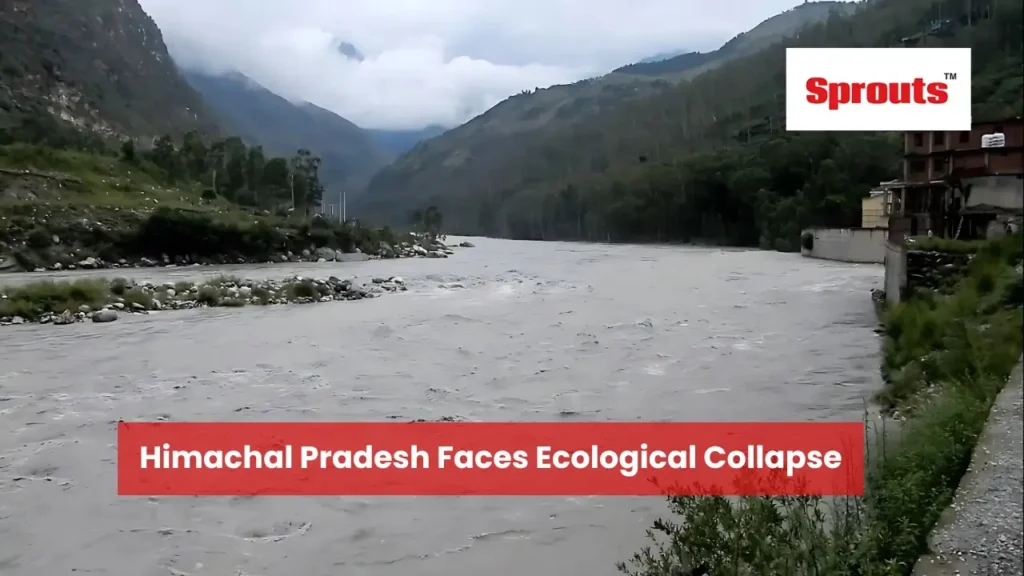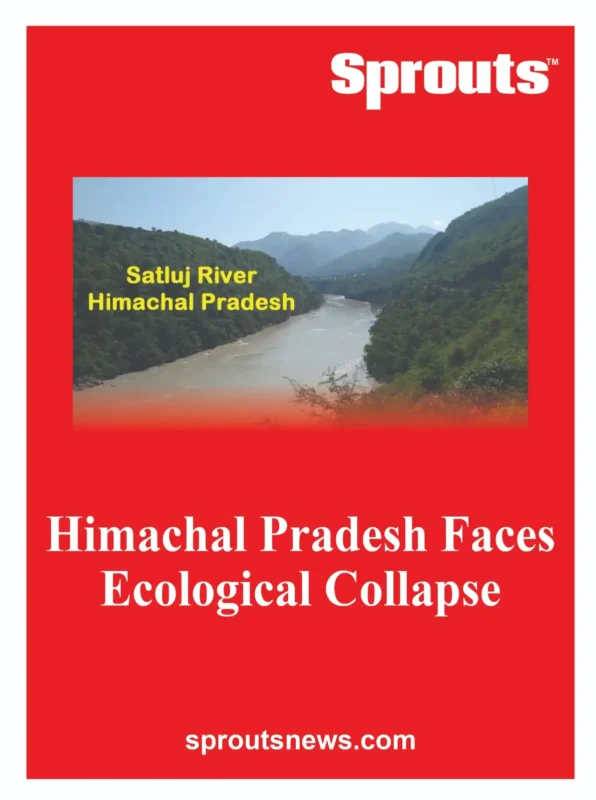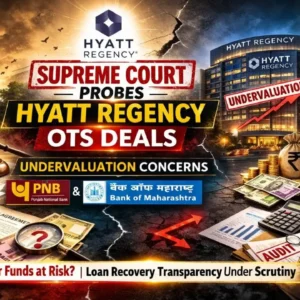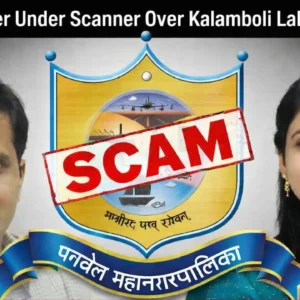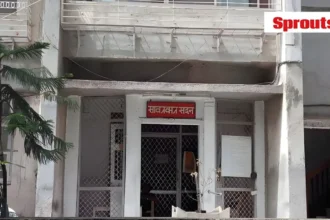Himachal Pradesh Faces Ecological Collapse
• Revenue vs. Environment: SC Slams Short-Term Greed
• Mountains Cry, Court Acts: Himachal’s Wake-Up Call
• Vanishing Hills? SC Orders Urgent Action Plan
• Tourism, Trees and Trouble: Hills Under Threat
Unmesh Gujarathi
Sprouts News Exclusive
Contact: +91 9322755098
Sprouts News Exclusive
Contact: +91 9322755098
The Supreme Court has warned that unchecked ecological destruction could cause Himachal Pradesh to vanish from India’s map. In a suo motu PIL, the Court blamed unregulated construction, hydro projects, deforestation, and tourism for the crisis. It directed the State to submit an action plan, citing urgent climate and environmental concerns.
Supreme Court Sounds Alarm: “Himachal Pradesh May Vanish From the Map”
In a landmark observation with nationwide implications, the Supreme Court has raised an urgent red flag over Himachal Pradesh’s spiraling ecological degradation. The Bench of Justices JB Pardiwala and R Mahadevan stated in no uncertain terms that if the current pace of environmental destruction continues, the day is not far when the State could “vanish from the map of the country.”
This stern remark came during the dismissal of a plea by M/s Pristine Hotels and Resorts Pvt. Ltd., which had challenged a June 2025 notification declaring Shri Tara Mata Hill in Himachal Pradesh as a green zone, thereby restricting fresh private construction. The Supreme Court upheld the notification and supported the Himachal Pradesh High Court’s decision to reject the company’s appeal.
Taking a proactive stance, the Bench invoked its suo motu powers to initiate a public interest litigation (PIL) focusing on broader issues of environmental protection and the growing climate crisis in the State.
Click Here To Download the News Attachment
Contents
- Himachal Pradesh Faces Ecological Collapse
- • Revenue vs. Environment: SC Slams Short-Term Greed
- • Mountains Cry, Court Acts: Himachal’s Wake-Up Call
- • Vanishing Hills? SC Orders Urgent Action Plan
- • Tourism, Trees and Trouble: Hills Under Threat
- Supreme Court Sounds Alarm: “Himachal Pradesh May Vanish From the Map”
- Climate Emergency Worsening: From Landslides to Floods, Man-Made Disasters Surge
- Hydro Projects and River Mismanagement: Sutlej Reduced to a Stream
- Unchecked Tourism Boom: Waste, Construction, and Collapse
- Revenue vs Sustainability: Court Warns Himachal Government
- Next Hearing on August 25: SIT Calls for Scientific and Transparent Roadmap
Climate Emergency Worsening: From Landslides to Floods, Man-Made Disasters Surge
According to the observations recorded by the Court, the situation in Himachal Pradesh has deteriorated dramatically. In recent years, the region has witnessed a marked rise in floods, landslides, and infrastructure collapse—directly attributed to rampant environmental neglect.
“In 2025 alone, hundreds have perished due to natural calamities,” the Court noted, adding that human activity—not nature—is the root cause of this devastation. The Bench cited excessive deforestation, unregulated construction, road widening, and poorly planned hydroelectric projects as core drivers of the crisis.
In stark language, the Bench observed, “Continuous land sliding of mountains, collapsing buildings, road subsidence—these are not acts of nature, but outcomes of unrestrained human interference.”
Hydro Projects and River Mismanagement: Sutlej Reduced to a Stream
The Sprouts News Investigation Team (SIT) reviewed the Court’s reliance on expert studies that revealed large-scale destabilisation caused by major infrastructure projects like Bhakra and Nathpa Jhakri. Many of these are located in sensitive river basins including the Sutlej, Beas, and Ravi.
Crucially, the Court highlighted that hydroelectric project operators have failed to maintain the minimum ecological flow of water as contractually required. As a result, aquatic life is vanishing and the once-mighty trans-Himalayan river Sutlej has been “reduced to a rivulet.”
The Sprouts SIT has long flagged concerns over Himachal’s energy-centric development model which, while lucrative, has sidestepped mandatory environmental impact assessments and geological studies.
Unchecked Tourism Boom: Waste, Construction, and Collapse
The Court also laid bare the severe impact of unregulated tourism in Himachal Pradesh. Once-pristine zones like Rohtang, Kullu, and Manali are now overwhelmed by garbage dumping, illegal constructions, and collapsing infrastructure.
The rise of religious tourism and eco-tourism without carrying capacity guidelines has turned fragile mountain areas into ecological dead zones. In particular, the Court criticised the State’s inability to manage solid waste in hill towns and trekking routes.
“The fragile mountain ecosystem will not survive this burden for long,” the Bench warned. “The absence of checkposts and enforcement has enabled illegal tree-felling and forest degradation.”
The Sprouts News Investigation Team (SIT) had earlier reported similar concerns from experts who have documented waste accumulation and unplanned hill station development in violation of ecological norms.
Revenue vs Sustainability: Court Warns Himachal Government
In a strong message to policymakers, the Court reminded both the Himachal Pradesh Government and the Union of India that environmental protection cannot be sacrificed for short-term revenue.
“Earning revenue is not everything,” the Court said. “It cannot come at the cost of the environment and ecology.”
The Court noted that the Advocate General of the State “fairly conceded” that the government had failed to address prior warnings issued by the judiciary. This acknowledgment may weigh heavily in future proceedings.
As a corrective step, the Court ordered that the matter be treated as a suo motu public interest litigation (PIL) and directed the State to file a comprehensive action plan within four weeks. The Bench clearly expects the government to submit concrete proposals, not vague promises.
Also Read: Government Penalises 30 (Thirty) Companies for CSR Defaults.
Next Hearing on August 25: SIT Calls for Scientific and Transparent Roadmap
The Supreme Court’s next hearing in the matter is scheduled for August 25. The Sprouts News Investigation Team (SIT) emphasizes that this case could become a turning point for climate jurisprudence in India.
Experts and environmentalists are now urging the Centre and State to formulate an evidence-based, enforceable roadmap that includes:
•Halt to construction in ecologically sensitive zones
•Retrofitting of existing hydropower projects with ecological flow compliance
•Strict waste management regulations in tourism zones
•Restoration of forest cover through community-driven afforestation
•Real-time environmental audits and satellite monitoring
Sprouts SIT reiterates that unless drastic and immediate policy interventions are undertaken, Himachal Pradesh may become a tragic case study in climate neglect.


